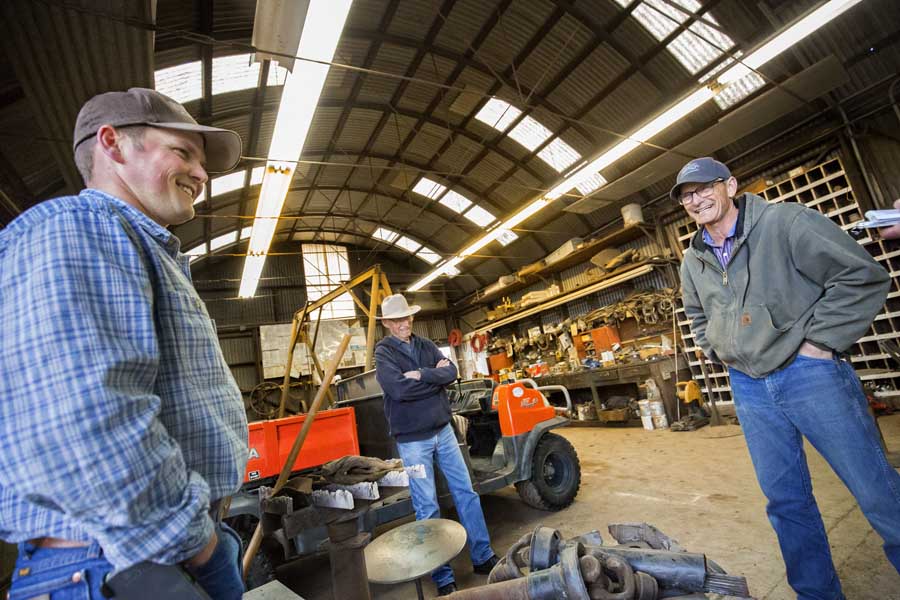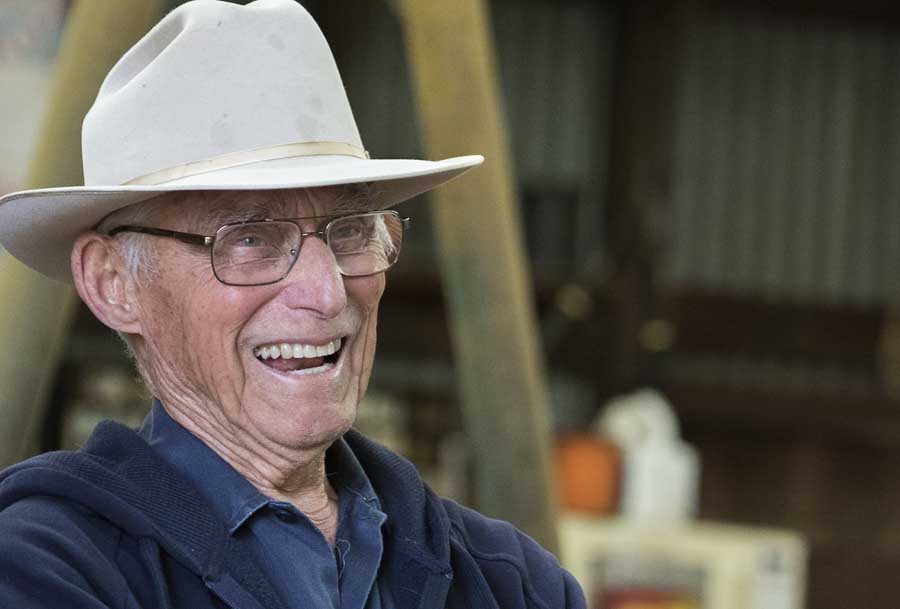
Three generations of the Bays family in a shop at Bays Ranches in Patterson, California: Daniel Bays, far left, his grandfather, Gene, center, and father, Ken. The trio recently completed a legal succession plan to determine how the family farm will be operated and owned for future generations, a move recommended for most family orchard businesses. (TJ Mullinax/Good Fruit Grower)
When Gene Bays farmed as a younger man, he hung ledgers on a nail in his shop, took his checkbook to an accountant once a year and let the division of ownership remain a mystery to those outside his family.
“Nobody knew how we cut the pie,” said Bays, the 89-year-old president of Bays Ranches of Patterson, California, one of the largest canned apricot growers in the state.
That is not good enough today. Family orchard businesses both large and small are being advised in conference after conference to spend time on succession planning.
The Bays, who sell fruit to processors such as Del Monte Foods, Seneca Foods and Tree Top have just finished their plan.
It was tough, they said, assigning monetary value and legal definitions to what had always just felt like family property and routine chores, not to mention discussing how things would change if — and when — a loved one died.
But all the stress proved smaller than they feared, they said.
“Once you got the conversation open and going and start the process, it goes easier,” said Ken Bays, 56, the vice president. His son Daniel, 29, is the secretary.
Day-to-day operational decisions they make informally, small ones on their own, large ones together.
Daniel does most of the fertilizer and tractor work, Ken handles water and cost accounting, while Gene handles most of the bills and “go-fer” duties. They make a plan of attack for each day.
“We have a corporate meeting every morning,” Gene said with a laugh. “McDonald’s. We have our special table.”

Gene Bays, 89, at Bays Ranches, in Patterson, Calif., on March 10, 2016. Bays founded what has become one of the largest processed apricot orchards in California. (TJ Mullinax/Good Fruit Grower)
But after decades of farming, the trio legally incorporated as Bays Ranch, separating the farming operation from the family’s land ownership, renting property from whichever family member owns it and stipulating on paper who gets what, when.
Succession planning is a hot topic in the fruit industry. Speakers at most meetings and workshops discuss it, while multigeneration farming families create boards of directors and sometimes hire CEOs from outside the family.
Today’s farm demographics demand planning.
The average age of the American farmer is 57 years; 80 percent of farmers plan to transfer assets to the next generation but only 29 percent have identified a successor, said Karen Bishop, of Ebey Road Farm in Coupeville, Washington, and manager of the Whidbey Island Conservation District. She cited AgriLegacy, a Tipton, Missouri, nonprofit dedicated to family farm preservation, as her source for the statistics.
“Without succession plans and the transfer of knowledge beginning early, the chance of a farm remaining an economically viable and productive entity is dramatically reduced,” said Bishop, who has made presentations about transition planning for farm conferences, in an email to Good Fruit Grower.
Among other suggestions, Bishop, part of a family with six generations on the same farmland, recommends families not only make a plan but continue to update it as people age and change.
She urges large families with conflicting ideas to consider splitting the farm into smaller companies.
“We just recently went through this, and it was the best thing we ever did,” she said. “I have recently worked with a family who owns several hundred acres here on Whidbey (Island) that is owned by 60 family members, all who have equal decision-making responsibilities. It is not working well.”
A sense of security
Regardless of the details, a written, legal framework with exit clauses and buyout procedures gives the Bays family a sense of security that the farm will continue.
“If something happens to any of us, things continue to go on,” Ken said.
The plan also allows the older generations to set aside a nest egg for all their children, whether they work on the farm or not, while being fair to those who do.
For example, Daniel has three sisters and several cousins. All grew up working summers on the farm to varying degrees. Daniel is the only one doing so full time now.
A written succession plan, drafted with the help of a lawyer and accountant, helped the family place a numeric value on the difference between those levels of involvement.
In fact, the family started the discussions in earnest after Daniel earned his degree in 2011 from California Polytechnic State University and returned to the farm.
“I came back and had nothing to offer other than labor,” he said.
The hardest part was convincing everybody in the family to speak their true thoughts and feelings, “not try to be just Mr. Nice Guy,” Ken said. •
– by Ross Courtney






Leave A Comment